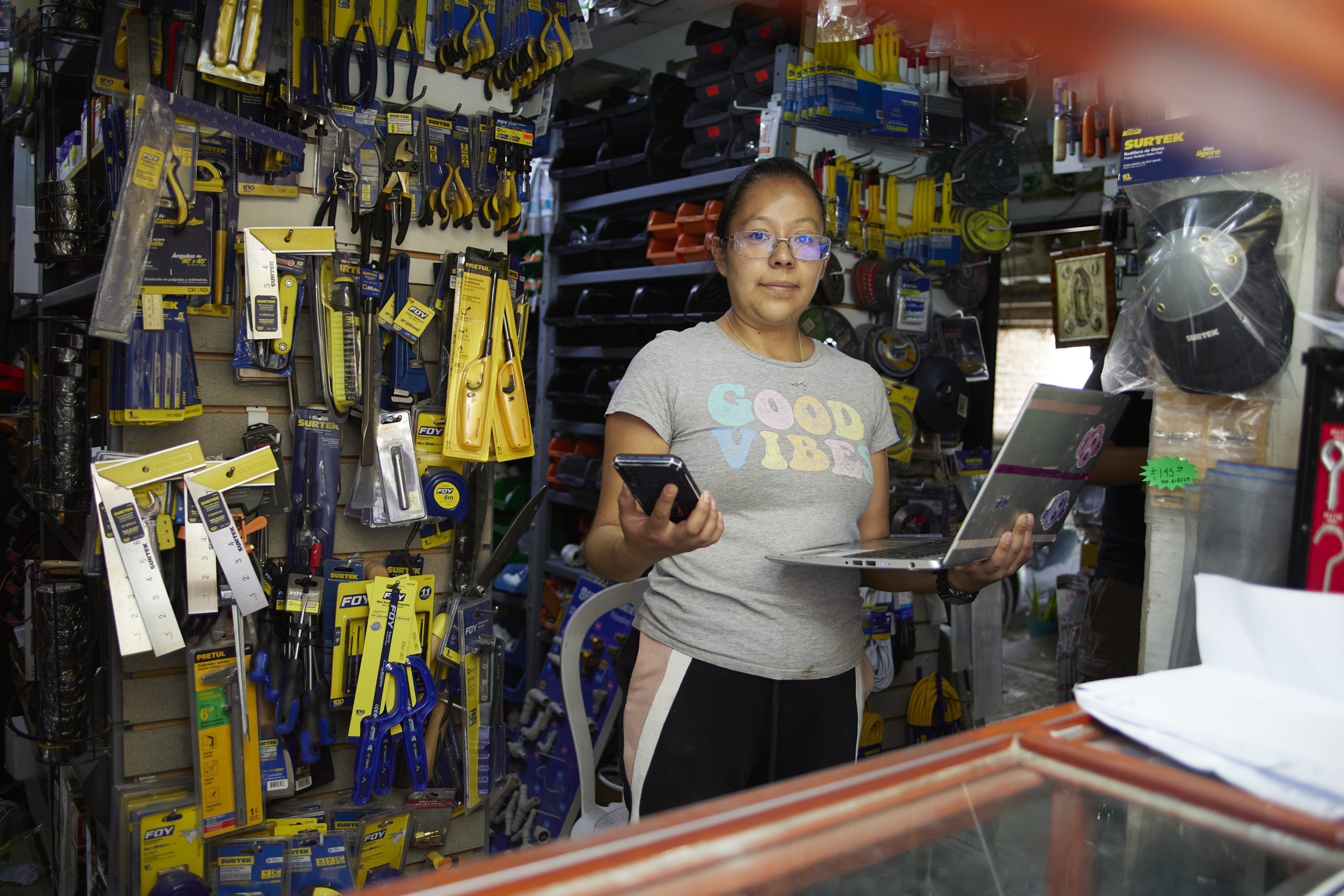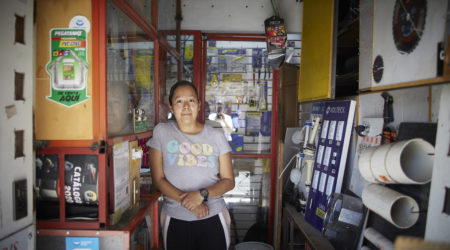Good, bad, or nill? Evidence of the impact of digitalization on MSEs in Latin America

In the ever-evolving landscape of business, digitalization has taken center-stage as an effective catalyst for growth, efficiency, and resilience for micro and small enterprises (MSEs). But, to determine just how effective it has been, evidence-based analysis is essential. This blog delves into the findings of an evidence map developed by Caribou Digital for the Strive Community – a global initiative unleashing the potential of small businesses as catalysts of inclusive growth. The map provides valuable insights into the positive and negative impacts of digitalization on MSEs, with a focus on Latin America and Mexico, in particular, shedding light on the path forward for digital transformation efforts in the region.
The insights were presented as part of Strive Mexico’s Exploration Series hosted by BFA Global on June 29th, 2023. Both the Strive Community and Strive Mexico are generously supported by the Mastercard Center for Inclusive Growth.
The quest for evidence: Unraveling the impact of digitalization
The potential of digitalization in driving MSE resilience, efficiency, and growth has long been acknowledged. Yet, the absence of concrete evidence to support these claims has left stakeholders seeking data-driven insights. To bridge this gap, Caribou Digital undertook an in-depth meta-analysis of the best literature on small business support programs in late 2022, forming the basis of the Evidence Map.
The Evidence Map was constructed by analyzing more than 700 studies, reports, and articles in English published between 2015 and the present. The research focused on micro and small enterprises (MSEs) with less than 10 employees and their experiences with digital and data-first interventions. Out of the initial pool of studies, 150 were chosen that reported measurable impacts on MSEs, aligned with the Strive Community’s theory of change. After further screening, over 100 studies were deemed suitable and provided valuable insights into the positive, negative, and null effects of digitalization on MSEs. Only 22 studies specifically covered Latin America and the Caribbean, with only six focusing on Mexico, indicating a significant lack of in-depth evidence in the region.
Thematically, the evidence map only includes literature focused on Strive Community’s four support areas:
- Upskilling & online engagement
- Digital business operations
- Digital market participation
- Digital financial services
The evidence found was plotted against the outcomes and impacts identified in the Strive Community theory of change:

The resulting Evidence Map is the only interactive (soon to be) public tool charting the evidence of digital and data-first interventions on MSEs.

Impact in LatAm: Positive and negative outcomes
The map revealed that digitalization has had overwhelmingly positive impacts across a number of areas for Latin American small businesses. The vast majority (70%) of studies included some element of digital financial services, whereas less than 10% included upskilling.
The map also shows that most studies included “bundled” interventions, combining different types of support. These findings showed that a bundled approach is an effective means of achieving long-term outcomes; in particular, combining digital financial services with new business management tools.
Surprisingly, the evidence map revealed relatively little evidence of negative impacts on MSEs. More than 80% of the studies included come from practitioner-led grey literature, which may be more hesitant to speak publicly about negative and null outcomes of their interventions, as opposed to rigorous randomized tests that tend to report the good, the bad, and the ugly.
Drivers of MSE resilience by areas of support
The Evidence Map highlighted the impact of digital financial services, digital business operations, digital market participation, and upskilling on MSE resilience. For example, the studies included made it clear that digital financial services played a particularly crucial role in enhancing financial resilience during the pandemic in Latin America, allowing MSEs across the region to access much-needed liquidity. Access to credit also emerged as a primary marker of financial resilience. Notably, social commerce and e-commerce experienced significant growth during the pandemic, contributing to resilience and growth for small businesses.
Evidence also revealed how Mexican small businesses mostly rely on familiar digital tools like WhatsApp or Facebook, that they rely on for personal use, which makes adopting them for business purposes easy and low-risk. During the global Covid-19 pandemic, the use of these tools was crucial for innovation and resilience. However, the adoption of more sophisticated digital tools, such as business, inventory, and financial management apps, remains relatively low in Mexico and other Latin American countries.
While digital upskilling has been recognized as beneficial globally, evidence specific to Latin America is scarce. Yet, when bundled with other products and services like credit and access to markets, digital upskilling has the potential to lead to long-term outcomes for MSEs.
Addressing gender gaps in digitalization programs
Evidence at both the global and regional levels in Latin America highlights the potential for digital programs that are not gender intentional to actually worsen gender inequality. Men tend to benefit more from digital interventions across all outcomes measured unless the approach is tailored specifically to women business owners. This can be done by addressing the barriers to women’s trust in and understanding of new products and services, and successfully addressing the social and cultural norms that restrict women’s ability to participate in markets.
Evidence gaps: Pathways to future research
While the Evidence Map provides valuable insights, it also highlights critical gaps in the research. The lack of rigorous and high-quality evidence focused on small businesses poses a challenge in identifying effective intervention levers. In Latin America, the evidence around non-financial elements of resilience and digital upskilling is particularly sparse.
Based on the findings from the Evidence Map, it is crucial to address the identified gaps in research to better support small businesses in Latin America. The actions needed include, but are not limited to:
Investing in research. There is a need for more rigorous and high-quality research. Public and private organizations should allocate resources to conduct in-depth studies that explore the impact and effectiveness of digitalization interventions on building and strengthening MSE resilience.
Exploring multi-dimensional resilience. While financial resilience is important, it is essential to investigate resilience from a broader perspective. Research should delve into the multi-dimensional aspects of resilience, including the operational, social, and psychological aspects that contribute to a business’s ability to withstand challenges.
Fostering digital upskilling. Given the increasing importance of digitalization, special attention should be given to promoting relevant digital upskilling programs and evaluating their effectiveness and impact on MSEs from a gender perspective.
Encouraging collaboration. Governments, academic institutions, and private sector stakeholders should collaborate to address the research gaps collectively. These partnerships can lead to more comprehensive studies and a better understanding of the challenges and opportunities faced by small businesses in Latin America and Mexico in particular.
By addressing these recommendations, we can enhance our understanding of effective intervention strategies for MSEs, particularly women-owned, promote their resilience, and contribute to a more sustainable economic growth in the region.
Strive Community: Small Business Digital Evidence Map
Strive Community is a global initiative of Caribou Digital and the Mastercard Center for Inclusive Growth aimed at unleashing the potential of small businesses as catalysts of inclusive growth. Strive Community empowers small businesses to reap the benefits of going digital across three areas:
- Business operations
- Financial services
- Market participation
The Small Business Digital Evidence Map will be launched publically in September 2023 as the first interactive, open tool, charting evidence on the impact of digital and data-first interventions on small businesses.
